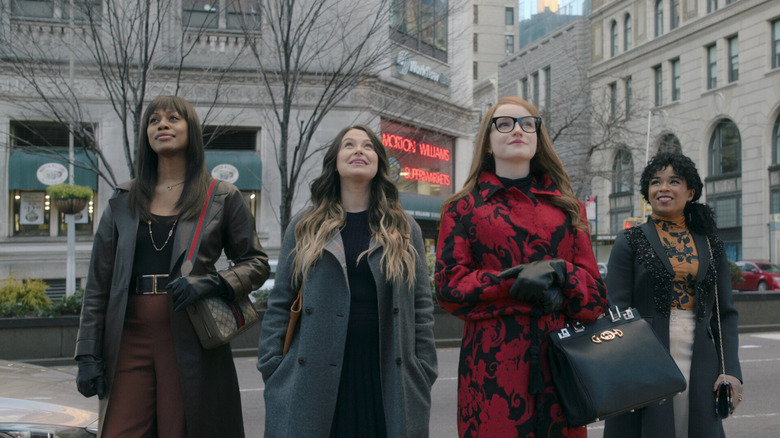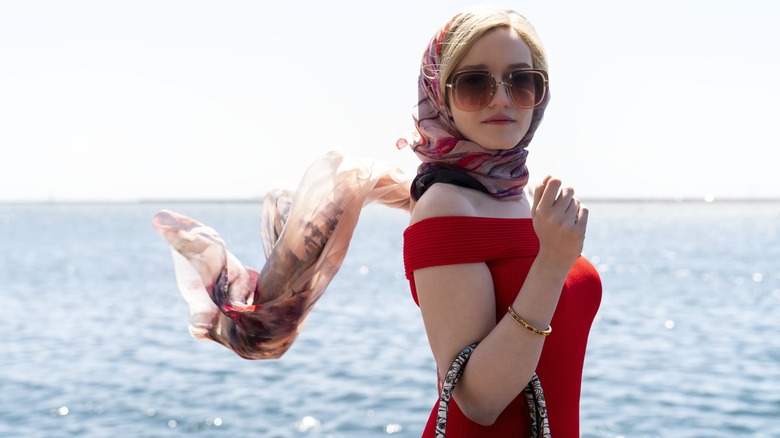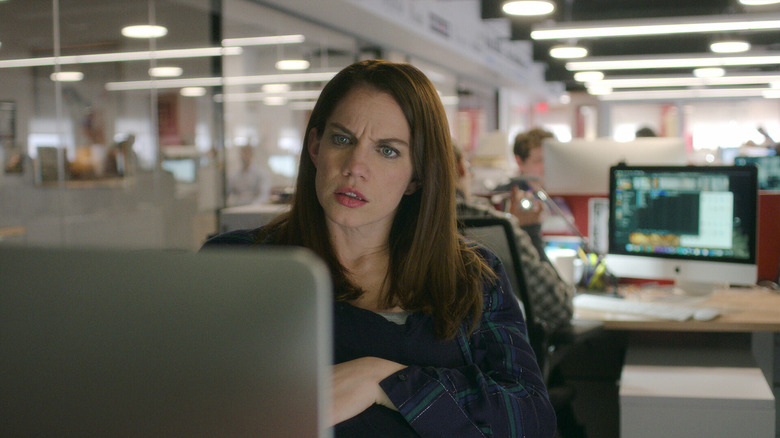The Lawsuit Over Netflix's Inventing Anna Miniseries Explained
Netflix scored itself a huge streaming hit with the miniseries "Inventing Anna," which followed the story of Anna Delvey, a con artist who worked her way up the high-end social scene in New York City. Much of the series, which hails from mega-producer Shonda Rhimes, was fictionalized but was ultimately based on a May 2018 New York Magazine article. However, the elements of the series that the streaming service chose to keep intact may have landed them in hot water.
As reported by The Wrap, former Vanity Fair journalist Rachel Williams is now suing Netflix for defamation. Williams was played in the show by Katie Lowes but, rather importantly, her name, occupation, and other key details were not changed. But the lawsuit alleges that the elements that were fictionalized did actual damage to her real name.
"Netflix purposely used my real name, and real aspects of my life, to create a totally false and defamatory characterization of me," Williams said in a statement. "The truth matters and portraying real people requires real responsibility. I am filing this lawsuit to hold Netflix accountable for its deliberate recklessness."
So what exactly is Williams suing for? What is she hoping to gain? And how likely is it that she is going to win her case? Let's dig in.
Why is Netflix being sued?
The lawsuit, which was filed in a Delaware federal court, alleges that Netflix "made a deliberate decision for dramatic purposes to show Williams doing or saying things in the Series which portray her as a greedy, snobbish, disloyal, dishonest, cowardly, manipulative and opportunistic person." Rhimes, it is worth mentioning, was very honest about the fact that "Inventing Anna" took liberties with the truth for dramatic effect during the press tour for the show. That could end up being a key sticking point.
Williams, the lawsuit further alleges, was "subjected to a torrent of online abuse, negative in-person interactions and pejorative characterizations in podcasts" as a result of the show's characterization of her. Alexander Rufus-Isaacs, an attorney representing Williams, had this to say in a statement:
"The reason why we have had to file this lawsuit is because Netflix used Rachel's real name and biographical details, and made her out to be a horrible person, which she is not. The devastating damage to her reputation could have been avoided if only Netflix had used a fictitious name and different details. Why didn't they do this for her, when they did for so many other characters in the Series? Perhaps the reason was that she had chosen to play for the other team, i.e., HBO. "
Indeed, the HBO deal that Rufus-Isaacs is referencing is by no means an ignorable part of this whole thing.
The HBO deal
Williams wrote a book about her experiences with Delvey (played by Julia Garner in the show) titled "My Friend Anna: The True Story of a Fake Heiress." The book was actually based on a 2018 story she had written for Vanity Fair about her real-life encounters with the individual at the center of the miniseries. Williams then later made a deal with HBO to adapt the book for the premium cable network.
There are a couple of key things to take note of here. For one, the events of Williams's HBO deal are actually depicted in "Inventing Anna." Again, despite fictionalizing a lot of the show, Netflix opted to keep this element of reality connected to Williams' life intact. The other thing to consider is that Netflix beat HBO to the punch, meaning that the deal they made with Williams essentially carries a lot less value now.
That's not to say two projects about the same thing can't be produced, however, being first is far more important when it comes to such endeavors. Thus, it seems increasingly unlikely that the HBO show will get made at all. We don't want to venture into speculative territory here but the fact that Netflix kept the name of the person who had a deal with a rival company in place to produce a show based on these same events does seem relevant. Williams is actually, per the legal filing, the only person whose full name is kept for the show, as well as her employer, school, and other details.
What will happen if Williams wins?
As of this writing, it has not been revealed just how much Williams is seeking in damages in the lawsuit. What we know for sure is that "Inventing Anna" was a gigantic hit for Netflix so whatever damage to her character is being alleged, the dollar figure attached to that would surely be great. It is also important to point out that it is only Netflix being named in the lawsuit, as Rhimes and her production company Shondaland have been left out.
While the precise damages being pursued through this legal action remain mysterious, the lawsuit does lay out that part of the goal is to have the alleged defamatory material that involves Williams being edited out of "Inventing Anna." That could prove to be tricky given her significance in the show and would undoubtedly alter the show as we know it.
One last key thing to note is that defamation trials are often difficult to win, so Williams will have to make a strong case. This also is far from the first time that Netflix has been in hot water over projects based on real life. Alan Dershowitz sued the company over the series "Filthy Rich," while chess master Nona Gaprindashvili also sued Netflix over "The Queen's Gambit," just to name a couple. So there is something of a pattern here in the aftermath of a hit based on a true story produced by Netflix.



